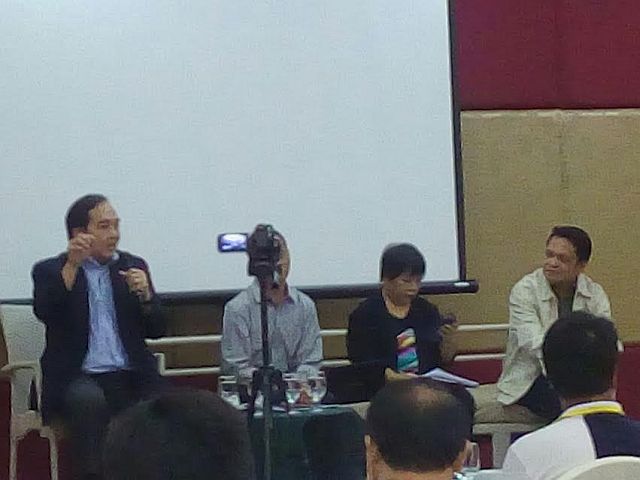
Board of Investments Governor Oliver Butalid (left) leads the discussion on the draft 2017 Investment Priorities Plan at the regional public consultation in Cebu City. (CDN PHOTO/VICTOR ANTHONY V. SILVA)
Board of Investments to focus on manufacturing, agri in 2017 plan
The country’s Board of Investments (BOI) is set to expand the coverage of the manufacturing segment in its investment policy for 2017 in order to scale up small enterprises and disperse employment opportunities outside urban centers.
BOI Governor Oliver Butalid said this was the theme of the proposed Investment Promotions Plan (IPP) for 2017–2019, which he described as “the most exciting” version in his six years in office.
“It is very appropriate. We have to scale up to keep up the economic growth trajectory, not only in services sector but more so in agriculture and manufacturing,” he said during the regional public consultation on the draft 2017 IPP at Golden Prince Hotel & Suites in Cebu City on Monday.
The draft IPP, he said, is aligned with the administration’s 10-point socioeconomic agenda and Ambisyon 2040, the long-term vision for the Philippines.
Butalid highlighted “bold” initiatives to achieve this and ensure that opportunities aren’t limited to large corporate conglomerates but are spread to micro, small and medium enterprises (MSMEs) as well.
New incentives
One of these is the broadening of the type of projects in the manufacturing sector eligible for incentives offered by the BOI.
He said that in past IPPs, eligible manufacturing projects either have to be export-oriented or listed as strategic in specific categories.
In the 2014 IPP, only eight products were listed as eligible for registration with the BOI, including car parts, aerospace parts, ship building, tool and dye and some chemicals, among others.
“Now, we are broadening it to include products for consumers in the domestic market,” said Butalid.
He, however, said this has yet to be finalized.
He said that anything that adds value and creates employment, even when it is for the domestic market, will be allowed to register with the BOI.
“The logic before was we needed to help manufacturers penetrate the export market. But now, the dynamics is different. We have a large domestic market, the purchasing power of Filipinos is high, and yet, we don’t have producers to meet the demand. What happens is we import,” said Butalid.
He said he hopes this move will help domestic producers to be competitive and capture markets here, including in food, furniture and even small appliances.
Half of industrial sector
Manufacturing makes up more than half of the country’s industrial sector and accounts for almost 25 percent of the Philippine Gross Domestic Product.
Between 2011 to 2013, the sector employed 3.7 million workers.
Under the draft IPP, only projects located outside Metro Manila may qualify for registration, except for modernization projects.
Furthermore, BOI will also allow agro-processing and business process outsourcing (BPO) projects catering to the domestic market to be registered, which Butalid said is also unprecedented.
Another initiative the BOI will introduce in the 2017 IPP’s preferred activities are projects that promote inclusive business models, especially in tourism and agriculture.
BOI-registered large- and medium-scale enterprises will be given additional incentives when they directly engage farmers and MSMEs in the value chain.
The draft 2017 IPP has a total of nine preferred activities such as all manufacturing activities, including agri-processing, agriculture and fishery, infrastructure and logistics including LGU PPPs, innovation drivers, inclusive business models, and environment or climate change-related projects.
After nationwide consultations, the BOI will forward the IPP to President Rodrigo Duterte for his approval by the end of the year.
The BOI, an attached office of the Department of Trade and Industry, is the government’s main investment arm that registers projects qualified for fiscal and non-fiscal incentives such as tax holidays, duty-free importation of capital equipment and employment of foreign nationals, among others.
Disclaimer: The comments uploaded on this site do not necessarily represent or reflect the views of management and owner of Cebudailynews. We reserve the right to exclude comments that we deem to be inconsistent with our editorial standards.




